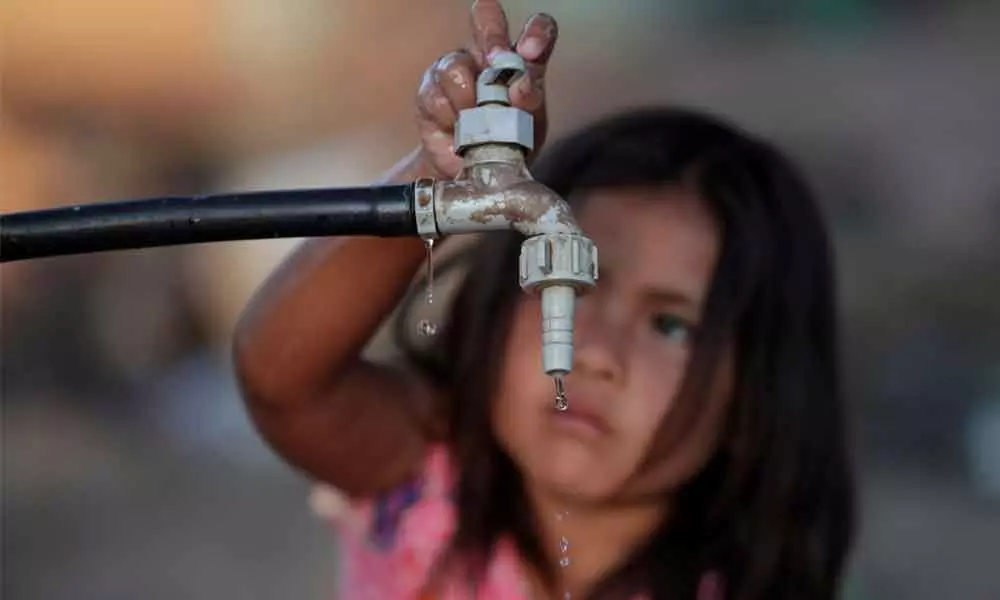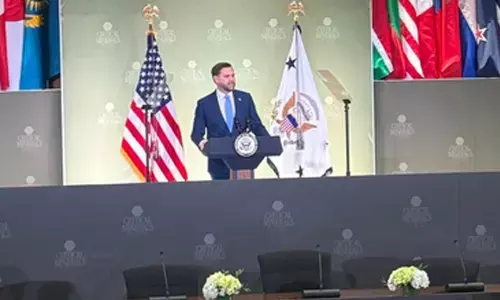Water, an under-used weapon in climate change fight

Using water more efficiently in everything from daily life to agriculture and industry would help reduce planet-warming emissions and curb climate change - a potential benefit that has yet to be widely recognised, the United Nations said on Sunday.
Using water more efficiently in everything from daily life to agriculture and industry would help reduce planet-warming emissions and curb climate change - a potential benefit that has yet to be widely recognised, the United Nations said on Sunday.
In a report issued on World Water Day, UN agencies said global warming would "affect the availability, quality and quantity of water for basic human needs", threatening the right to water and sanitation for "potentially billions of people".
But as well as using limited supplies more wisely and fairly, policymakers and businesses should also seek to manage water resources better to economise on the electricity and fuel needed to pump, clean and deliver water, the report said.
"If you save water, you're saving energy and reducing the greenhouse gases to produce that energy to bring the water," said Richard Connor, the report's editor.
Using less energy cuts down further on the water needed to produce electricity, creating a virtuous circle, he said.
Even more water can be saved by switching to less-thirsty clean power sources like wind instead of fossil fuels, he added.
Water use has increased six-fold over the past century and is rising by about 1% a year, said the United Nations World Water Development Report 2020.
It outlined ways water could be used and recycled more effectively to limit emissions, alongside looking after nature.
Restoring and protecting wetlands, for example, is of "critical importance" because they store twice as much carbon as forests, while also preventing floods, purifying water and providing a habitat for animals and birds, the report said.
Conservation agriculture - a green farming approach that causes minimal disturbance to the soil - also helps reduce carbon emissions and the huge amounts of water needed for crop irrigation in intensive farming systems.
Treating more wastewater would also make a big difference, said the report, noting 80%-90% of wastewater is discharged to the environment without any form of treatment.
Untreated wastewater is a major source of methane, a powerful greenhouse gas, while wastewater treatment accounts for an estimated 3%-7% of all emissions, due to the energy and biochemicals required for the process.
The best solution, the report said, is to invest in modern techniques that extract methane from organic matter in wastewater and use this biogas to generate the energy needed to treat the water - a method already used in some water-scarce countries like Jordan, Mexico, Peru and Thailand.
As a result, public utilities there have reduced carbon emissions by thousands of tonnes, while making financial savings and providing a higher-quality service, it added.
One of the main barriers to these types of approaches is a lack of cooperation between government officials working on climate change and those tasked with managing water.
"The disconnect remains abundantly clear at the policy level," said Connor.
For example, the 2015 Paris Agreement on climate change does not mention water, the U.N. report noted.
The national climate action plans submitted by countries under that pact generally acknowledge the importance of water, but few have so far presented and costed specific projects, it added.
"When it comes time to move from talk to action - be it finance or otherwise - the talk falls on deaf ears and water gets put aside and ... left behind," said Connor.
More concrete efforts to adapt to rising water stress and cut emissions from water use will require joint planning between climate change and water specialists, as well as greater investment to put them into practice, the report said.
Water management, water supply and sanitation services are under-funded, it added - but by tackling global warming as well as water challenges, projects could aim to capture a larger share of climate finance.
In 2016, only 2.6% of $455 billion invested in climate change measures was allocated to water management, it noted.
That may be starting to change.
In the past four years, the Green Climate Fund, for example, has approved two projects in Sri Lanka to upgrade village irrigation systems, protect water catchments, and promote climate-smart farming practices.
"Water does not need to be a problem – it can be part of the solution," said Audrey Azoulay, director-general of the United Nations Educational, Scientific and Cultural Organization.














